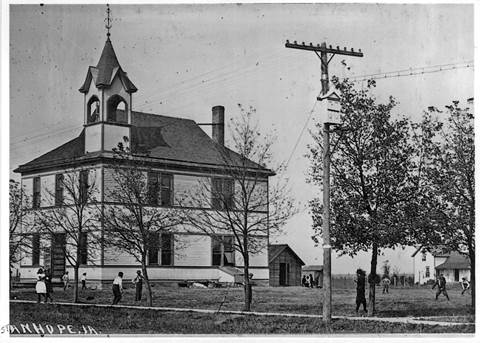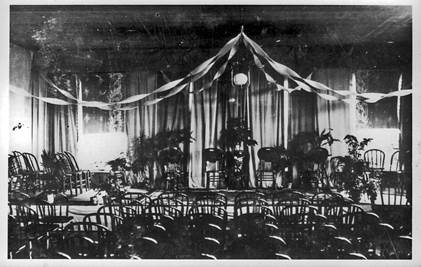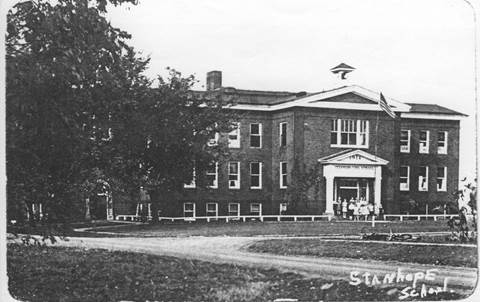History of Stanhope High School
Submitted to the IAGenWeb Project by Wayne Romp, 2014
FOREWORD
Now let me think, just when did he/she graduate? Who all was in that class? Did he/she graduate before or after. . . . How many were in that class? How many times have you asked any of these questions? The first part of this history was originally published in Volume V, Number 39 of the STANHOPE OBSERVER. Fred C. Runkle, Editor and Publisher of Stanhope’s own newspaper, compiled a history and listing of graduates up to and including the Class of 1939. This was printed in his May 18th edition of that year. We have reprinted his article here and added pictures of all the graduating classes that we had access to. The closing remarks were reprinted from my own personal experience, recollection and observations. We trust you will enjoy the results of our efforts.The first time I
put together a History of Stanhope High School, (1988), I had access
only to the names of those who had graduated. I was given permission by the Alumni Board in 2006 to go ahead and copy all of the class pictures in the big book located in the Stanhope Library. This book was assembled from the framed class pictures that hung in the former high school building. Duane and Norma Engelby along with Mervyn and Maxine Dick were two couples instrumental in preserving these pictures, assembling and building the book to hold them for display. Concern has been expressed about the possibility of losing this book (we had a fire in the community building in 1965). Without the efforts of those dedicated to the preserving of school history in our community, the publication you are now holding would not have been possible. I am deeply grateful to Mr. Runkle for his article, and to those with foresight in maintaining the pictures that has made this publication possible.
Wayne A. Romp
Class of 1957
Click photos to enlarge

In approximately 1893, this was the new Stanhope School building, located in the 400 block of Main Street. In 1902, permission was granted to use space in this facility to offer a one year high school course.
Stanhope High School History
As written & published by
Fred Runkle, May 18, 1939
The history of Stanhope High School had its beginning in 1902. That fall, a young man came from Winterset, Iowa to be principal of the school. They were called principals in those days, but now are known as superintendents. At the opening of the school, he found four pupils who had completed the eighth grade and were in need of some high school education. The board then consisted of Iver Johnson, President, H.E. Fardal, G.F. Kepler, C.S. Brewer, and Grant Kent, who gave permission to organize a first year high school course. The school then consisted of three rooms, with three teachers, Fred C. Runkle, Pearl Watson, and Belle Iverson. This class consisted of one boy and three girls. A few days after school started, the boy, Imbert Johnson, was appointed rural carrier on one of the first of three mail routes then established out of Stanhope. He accepted a route and carried the mail until his retirement thirty years afterward. One of the girls, Miss Nellie Bute was taken ill in the spring and returned the next year to graduate. Pearl Brewer and Ida Iverson were the only members left. The first commencement was held at the Methodist church on Thursday evening, June 18. The community showed much interest and cooperation in doing everything that could be done in making this commencement a success. The church was packed with people who came to see the graduation of Stanhope’s first High school class. The famous old quartet composed of Frank Ristrim, L.E. Morris, Oscar Brewer and Ned Parker furnished the music, and Rev. L.E. Follanbee of Des Moines, Iowa a popular Lyceum and Chatauqua lecturer of that first class of the school consisting of two girls with one year of high school work were the schools first graduate. Pearl Brewer later finished her high school work at Webster City and then completed her college work at Drake. She was the wife of Rev. M. Bayard Pringle, pastor of the Church of Christ, at Council Bluffs, Iowa. Mrs. Pringle is also an ordained minister of the church.
Ida Iverson attended school at Sioux Falls, S.D., and Chicago, and became a supervisor of music. For several years she was music supervisor at Centerville. Her pupils won many honors in the state music contest.
The class of 1904 was composed of Evelyn Ferguson, (Mrs. Nels Hendrickson) who became a teacher. Alma Lavine became Mrs. D.R. Knight, she died years ago. Maude Sandal married George Nelson and now lives at Greene. Myron S. Anderson continued his schooling. He graduated from Simpson College, earned his Masters Degree in chemistry at Iowa State, and acquired a PhD from Washington University. He is assistant chief of staff in Soil Research Chemistry, Bureau of Soils Division of Agriculture at Washington, D.C. Floyd Watson was the other boy in the class. The last known of him he was living in San Francisco. Nellie Bute, long employed in Kansas City, is now Mrs. Carl Weaver of that city. Olive Lavine is Mrs. Henry Jacobson of Stanhope; Lola Ferguson became a teacher and is now Mrs. George Fisher of Nasua, Mont.
There was no Class in 1905.
The Class of 1906 was composed of Leo Dick, who graduated from chemistry from Iowa University and was a famous halfback on the football team there. William Johnson attended the school of dentistry at Iowa with Dick, graduated at the same time and has practiced dentistry in Stanhope since his graduation. Elvin Bute has lived for many years at Waterloo and has been a railroad conductor with the Illinois Central R.R. for years. Emma Sandal is Mrs. Vern Bergland of Stratford. Ferbia Ferguson graduated later from the University of Wyoming and when last heard of, she was managing a large ranch in Wyoming. Celestial Bute married Dr. B.F. Ward and lives at Anthon. Jenny Welty left for Wyoming with her parents, became a teacher, and is now Mrs. Lutzkie of Chugwater, Wyoming.

The site for the graduation of the Class of 1908 was this setting in the Fardal Opera House, all decorated for the event held on June 5. This stage was in the former Wade Hatchery, later the Maples Farm Store. Today, in 2008, the building is owned by Thomas Alexander.
The course of study was increased to a two year high school and the first two year class, that of 1908, was composed of Eva May Riley (Mrs. Carl Adams), Webster City; Jessie Smith, (Mrs. L.L. Lyle)Webster City; Ethyl Davis (Mrs. Leo Dick) Oakland; and Eunice Bute (Mrs. A.W. Miller) of Stanhope. Eunice returned to school later and completed the four year high school course.
The Class of 1910 was composed of two girls, Carrie Peterson (Mrs. Nels Tolstrup), Kamrar, and Ruth Kent (Mrs. Clyde Buechler), Boone.
The Class of 1911: Mildred Swanson (Mrs. Cook), Guthrie, Okla., Carrie Sandal (Mrs. George Seimsen), Stanhope; and Agnes Snyder (Mrs. Clarence Tjernagel); Mt. Vernon, Washington.
The Class of 1912: Clarence Johnson, welfare administrator at Manchester; John E. Bute, head of a department, men’s furnishings, Washington D.C.; Jullian J. Fardal, farmer and stockman, Stanhope, and Clarence E. Dick, deceased.
It would be interesting to continue a record of all the classes, their address and occupations, but space would not permit, so only rolls of the various classes will be continued. In 1928, ‘29, and ‘30, the school maintained a school orchestra that won both state and national attention. During those years the orchestra won the Class C contests each year, and in 1930 competed at Lincoln, Nebr., in and won the national championship. Trophies in the possession of the high school attest to the success of this orchestra. (Currently, in 2008 located at the Stanhope Library).
To resume the list of classes we find the classes following in regular successions.
The Class of 1913: Bessie Kepler, Irene Sogard, Hazel Riley, Mabel Dick, Alice Peterson, N.H. Nelson, Harry Read, Severt Mathre, and Hazel Snyder.
The Class of 1914: Arthur Bockwoldt, Irene Davis, M.R. Smith, J. Elmer Mathre, Evan K. Philp, Arthur M. Anderson, Erma Philp, Dewey Kepler, and Everett Stark.
(I think it should have been noted by Mr. Runkle that an eight room brick building was constructed in 1914. Incidentally, the bell from the original schoolhouse was installed in the then new brick structure. Today, (2008) this bell is at the corner of the Stanhope City Park, and the original school is a private home located at 545 Alfred Street).
The Class of 1917 was the first four year class to graduate. Class members included: Hazel Satre, M. Eugene Fardal, Arthur N. Fardal, and Inger Hanson.
The Class of 1918: Nelson Dick, Audley Kent, Helen Mathre, Vera M. Trotter, Lillian Nelson, and Julian McFarland.
The Class of 1919: Marvin East, Gertrude Fardal, Marie Hove, and Alice Nelson.
The Class of 1920: John E. Fardal, Claire Groves, Leslie Hove, Veda Morris, and Wilma East.
The Class of 1921: Olive Hill, Clarence Nelson, Helen Olson, and Ruth Schweppe.
The Class of 1922: Wayne Dick, Herman Hanson, William Parker, Lila Kent, Helen Kepler, Della Hamilton, Edna East, Pearl Schmidt, Eunice M. Bute, and Marie Fosberg.
The Class of 1923: Beryl Cottington, Ferman Carlson, Ransom Carlson, Marie Carlson, Donald Hamilton, Merle Hamilton, Russell Van Note, Ruth Van Note, Mary Harvey, Martin Anderson, Marvin Snyder, and Elmer Malmberg.
In 1923, four classrooms and a gymnasium were added to the original brick building. The class of 1923 was the first to graduate using the gymnasium for the ceremonies.
* * * * * * * * * *

We were unable to locate pictures The Class of 1903 Ida Iverson and Pearl Brewer
The Class of 1904 Alma Levine, Myron Anderson, Evelyn Ferguson, Mrs. Maude Nelson, Floyd Watson, Nellie Bute, and Lola Ferguson
The Class of 1910: Carrie Peterson and Ruth Kent
The Class of 1911: Mildred Swanson, Carrie Sandal and Agnes Snyder
The Class of 1912: Clarence Johnson, Julian Fardal, Clarence E Dick and John E Bute
Further Reflections
The classes of 1960, 1961, and 1962 were graduates of the newly formed South Hamilton School who graduated from the Stanhope Center. Starting in 1963, graduates from the four centers of Jewell, Ellsworth, Randall, and Stanhope were graduates of South Hamilton. The Class of 1962 was the last class to graduate under the name of Stanhope High School, the last to publish the VIKING yearbook, and witnesses with us to the end of an era. That class dedicated their yearbook to the Stanhope High School “for the wonderful years we have spent there. We are proud to have graduated from Stanhope High School, rich in its traditions and memories”. In reading their class history, I found it interesting that in their second year of school, one of their best remembered events was when this class moved into the then new $45,000 grade school addition. “We were the first class to move, and what a thrill it was! “New desks, a coat room, and new everything.” I was always proud that we had wisely spent funds for additional classrooms when in retrospect, I’m sure there must have been pressure put on the Board of Education to build a bigger and better gymnasium as was done at other nearby school systems.
The Stanhope School continued to house classes up thru the ninth grades until 1968-69 when the junior and senior high school was combined at Jewell. The fifth and sixth graders were eventually sent to Randall, leaving the first four grades in Stanhope.Finally, the school board voted to close the buildings in Stanhope and at Ellsworth, then eventually the Randall center.
In May of 1977, the Low-Cost Housing Committeemembers were busy trying to raise funds for the purchase of a lot or lots in order to proceed with badly needed low-cost housing within the community. That same month, in response to an article in the South Hamilton Record/News I wrote a Letter to the Editor to suggest that the housing committee, the city mayor and council, and the South Hamilton School Board get together and perhaps with community support, the school site might one day become the location for the apartments. A similar situation existed in Duncombe at this same time. Their school site was given to the City of Duncombe, and the property made available to a low-cost housing committee there. Before long, I found myself as Mayor of Stanhope meeting with the low-cost Housing Committee and the South Hamilton School Board. In 1978, both the City of Stanhope and the City of Ellsworth accepted from the school board, the respective buildings in each community. I can state as Mayor, I bought the Stanhope High School building for one dollar.
I was just as sad to see the building being torn down as were many others, but keenly aware of what happens when buildings stand empty.
We are very proud of our Stanhope Housing group for the very fine apartments which they constructed on the site.
|